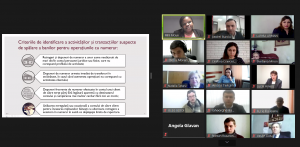Increased interest in AML/CFT trainings. Over 100 participants at the latest workshop
The AML/CFT trainings are of increasing interest to reporting entities. The proof of this is the latest training workshop that brought together over 100 participants, interested in best practices in this field, but also in the measures they should take to comply with AML/CFT requirements.
In the last few years in Moldova, the AML/CFT field has been subject to increased attention. The authorities adjusted the legislation in this area, establishing rules and requirements for both supervisory institutions and reporting entities. The new provisions, however, came along with a series of uncertainties and question marks from both sides. What do prudential measures entail? What are the criteria for identifying suspicious transactions? When and how should they be reported to avoid overzealousness? These are just some of the questions that employees with AML/CFT responsibilities frequently ask.
While other countries seem to have reached an advanced level of understanding and application of AML/CFT standards, Moldova continues to face a lack of expertise in this field. Considerable capacity-building support came with the trainings organized by the USAID Financial Sector Transparency Activity (FSTA). The international AML expert spoke to the attendees regarding best global practices, but also provided a series of guidelines on each of the topics presented.
The AML/CFT trainings events are of great interest among those concerned. The latest workshop – intended for reporting entities, namely non-bank payment service providers and electronic money issuers – attracted more than 100 participants.
For two days, they had the opportunity to recap the most relevant provisions of the AML/CFT legislation in force, but also to find out what are the recommendations of international organizations such as MONEYVAL or FATF. At the same time, the workshop provided an efficient platform for debate and exchange of views, during which those present were able to share their experience and find answers to their questions.

Denis Morari works as a compliance officer within a payment service provider. Although he has more than two years of experience in this field, he admits that he has encountered some difficulties in the practical applicability of the AML/CFT provisions. “I was very happy when I saw the agenda of the training workshop, as I saw that it addresses new issues such as risk analysis in transactional processes, Know Your Customer, or identifying actual beneficiaries. But most importantly, we had the opportunity to analyze concrete situations that may arise in our activity“, Mr. Morari says.
In addition to the simulation exercises, the FSTA expert also prepared several form templates that participants could use in their daily activities. “The forms made available to us are extremely useful, especially the risk reassessment form that will allow us to improve our Internal Compliance Program and thus become more efficient in managing and reporting potential risks“, added Denis Morari.
Ana Brinzila, head of the Office for Preventing and Combating Money Laundering within the State Enterprise “Posta Moldovei” (the national postal operator), is of the same opinion. “The guidelines provided by the FSTA expert will guide us in our efforts to improve our internal policies. And presented forms will help us to align to the good practices and international standards in this field.”, Ms. Ana Brinzila underlined.
The evaluation carried out after the training showed that most of the participants would like to participate in other AML/CFT trainings as well, and also indicated the topics of interest. In 2021, the FSTA will organize several training sessions in the field of AML/CFT, which will allow the participation of representatives from other reporting entities.